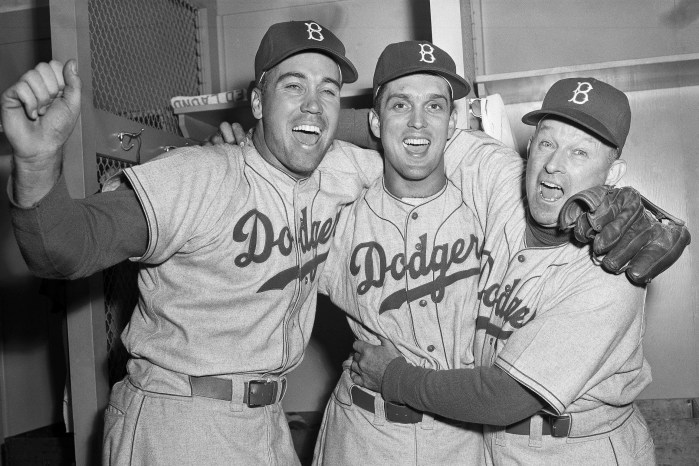By then, with all the 2009-style Big Guys and Bad Guys and Bankers and CEOs and Wall Street Gunslingers laid to rest, at least temporarily, we’ve learned the mantra of what the old New Deal — the FDR New Deal — gave us:
Crystal Field’s Theater for the New City ensemble again delivers
HISTORY speaks: “You are back in the 1930s, the days of the Great Depression. I’m going to give you a lesson from those days of struggle, to teach you how to Navigate the Future…”
VOICE OVER (as, on stage, we see WPA-type scenes of the starving, the homeless, the jobless, the scared, vintage 1932): “One-third of this nation ill-housed, ill-clothed, ill-fed…”
Those were the years, says History (a/k/a Theater for the New City actor Mark Marcante), of breadlines, bank failures, foreclosures, Okies, sit-down strikes and the Bonus Marchers — thousands of ragged World War I veterans driven from their Tent City in the Capitol by the tear gas and bullets ordered by Gen, Douglas MacArthur.
“All together now,” shouts a character from the small stage that has unfolded from a truck but is quite large enough to encompass a city, a nation, a multitude, “let’s make a Cell-phone Symphony to tell the government [the 2009 U.S. government] what we want it to do!”
Sure enough, the audience sitting out front on milk crates or folding chairs or leaning out window sills may be of rather modest circumstances, but nobody is too poor or too young to have a cell phone, and on the invitation they now whip them out and, urged on by a terrific five-piece combo, participate heartily in a Cell-phone Symphony urging new New Deal action on all those wheelers and dealers down in Washington.
This is, you see, the summer street theater of indomitable director/author Crystal Field’s TNC — which for six weeks every August into September tours the streets, parks and playgrounds of all five boroughs with free — yes, free. Field’s straight-from-the-neighborhood brand of social comment and wishful impact concerns the (always outrageous) matters and morals of our time.
“Tally Ho!, or Navigating the Future” premieres at 2:00p.m. on Saturday, August 1 at on East 10th Street between Second and First Avenues (nearer to First), around the corner from TNC itself.
Six weekends and 11 performances later, it plays Washington Square Park before wrapping things up on Sunday afternoon, September 13, at St, Mark’s Church (Second Avenue and 10th Street), right up the block from where the cycle started six weeks earlier.
The 8-hour workday.
The 40-hour workweek.
The Child Labor laws.
The first Anti-Lynching law.
The minimum wage.
Banking oversight.
Anti-Trust laws.
Workman’s compensation.
Unemployment insurance.
And (but you must hold your breath)…
The Social Security Act of 1936.
Crystal Field, cofounder of Theater for the New City with then husband George Bartenieff, has been writing and staging street theater in New York since 1976, and started seven years before that with street theater in Philadelphia.
“No,” Field says, “I wasn’t around” at the height of the Great Depression of the 1930s, “but I heard all about it from my mother. At one time she’d worked in a candy factory in New York, and they let you eat all the candy you wanted that dropped on the floor.”
Her mother would one day become the fine, dedicated Dr. Fannie Stoll, a wonderful old lady whom I chatted with at TNC street shows in the years just before her death not long ago at 98.
“My parents were very, very active,” says Field, who remembers not getting her first “bought dress” — a “stripey cotton, size Chubette” — until she was 12. “When they talked about the Depression, they always said there’d be another one.”
Which is of course exactly what happened seventy-plus years after Wall Street’s Black Tuesday of 1929, and is also what “Tally Ho!, or Navigating the Future” is all about.
Theater for the New City’s annual summer street shows don’t just hatch, like eggs. There is a considerable gestation period, all of which starts in a brown paper bag in Field’s kitchen drawer.
“In there I shove notes and ideas and scraps and pieces of paper.” These scraps all feed into a 2-week workshop at TNC each spring, based on a rough scenario. Then Field repairs alone for two weeks to the trailer she’s long had in the woods up past Poughkeepsie “on the wrong side of the river, three or four miles from the General Store.”
That trailer is where she puts in the hard writing, with which she returns to the city for a 3-week rehearsal period. Et voila!
Field did a ton of research while writing “Tally Ho!” and had leading cast members read the same books and study the same photographs she was absorbing.
“In the 1930s, there was almost a revolution in this country;” she says. “The New Deal really saved everything.
That’s what Roosevelt did — he saved capitalism.”
So why isn’t there a revolution now?
“It hasn’t been bad enough. But it will happen again unless they put back all of the New Deal along with Universal Health Care. I’m really not a Socialist,” says Field, “but it’s coming. Unless…”
Yes, she thinks the new president is trying his best, “but I don’t think he can do it alone” — and this too is what “Tally Ho!” is urging. “When the people move, things get done. When they don’t move, nothing gets done.”
Oh, sure, there are oversimplifications and stock figures aplenty in “Tally Ho!” — it’s the nature of street theater to oversimplify — but that doesn’t lessen, and indeed increases, the warmth and one-to-one interaction of actors and audiences. There is also, dear God, a climactic group sing in praise of Lower East Side community gardens. That’s virtually Field’s trademark.
Leading roles are played by Mark Marcante, who has been Crystal Field’s all-purpose strong man at TNC for many years; by Primi Rivera as Big Guy, a sort of profit-hungry, power-hungry villain, what my father would have called a rotating son of a bitch no matter which way you looked at him; and by Michael David and Alexander Bartenieff (Crystal’s 39-year-old son) as a couple of smartass Wall Street wolves.
Field herself has a small role — that of a mama who, when her son (the less voracious of those two wolves) says reassuringly: “It’s all in the numbers, Mom,” tartly replies: “In my day they had the numbers game, but at least they paid when your number came up.”














